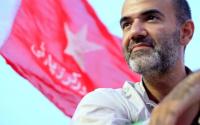Common Dreams / Published on Wednesday, October 19, 2005 by OneWorld.netNiko Kyriakou
In an unprecedented move, a UN committee has asked human and civil rights groups to submit reports and testify on U.S. breaches of international law, filling a gap left by the U.S. government's failure to submit its own report.
The 18-member United Nations Human Rights Committee, which reviews nations' compliance with the International Covenant on Civil and Political Rights, began reviewing country reports Monday and will complete its session on October 24.
But for the third time since ratifying the treaty in 1992, the United States has failed to submit its five-year report to the committee on U.S. violations of the treaty.
The treaty, which entered into force in 1976 and has been signed by 155 countries, outlaws torture or degrading treatment, protects self-determination, and ensures that all people everywhere are treated within the law.
Without a U.S. report, the committee usually skips over discussions of U.S. compliance.
But anticipating an absent U.S. report, the Human Rights Committee took precautions this year.
Last August, the committee sent a letter to a number of U.S.-based non-governmental organizations (NGOs), including the American Civil Liberties Union (ACLU) and the World Organization for Human Rights USA, requesting reports on U.S. transgressions of the treaty, to be used in case the U.S. itself failed to report.
Specifically, the committee's letter requested documentation relating to, "the fight against terrorism following the events of 11 September 2001 and notably the implications of the Patriot Act on nationals as well as non-nationals; and problems relating to the legal status and treatment of persons detained in Afghanistan, Guantanamo, Iraq, and other places of detention outside the USA."
The move represents a new level of intensity by the United Nations to hold the United States accountable for what is widely seen by rights groups as an increasing disregard of human rights by the U.S. government at the highest level, and at the same time an elevation of the status of NGOs within the UN system.
"It was a very unusual request. As far as I know it's never happened before," the Executive Director of the World Organization for Human Rights USA, Morton Sklar, told OneWorld.
"It's highly unusual for them to call a special session without a report having been filed," he said.
Sklar testified at the opening of the committee's 85th session on Monday condemning what he called a "wide-ranging set of policies" set forth by the U.S. government that "authorize the use of torture as a means for obtaining intelligence regarding terrorism, and that ignore and seek to restrict the application of a number of key international standards."
"They have claimed these are the acts of a few devious individuals, when the reality is, they are part of a pattern of policies that the U.S. government has sought to condone and excuse in the war against terror," Sklar told OneWorld.
Sklar's report to the Committee focuses on cases of "extraordinary rendition" in which the U.S. has sent suspected terrorists to nations where they can be interrogated using techniques not permitted in the United States, and on the detainment of "unlawful enemy combatants" for indefinite reasons.
The World Organization report also highlights U.S. failures to notify international authorities of the capture and detention of suspected terrorists, and the use of special tribunals to prosecute detainees and other "enemy combatants."
Sklar asked the international community not only to condemn such acts but urged the committee to hold the U.S. government itself, and its officials at the highest levels, accountable.
The ACLU also submitted a 37-page report to the committee describing specific U.S. breaches of the political and civil rights covenant.
The report included sections on "Excessive Government Secrecy"; "Racial Profiling of the U.S. Arab, South Asian, and Muslim Communities"; "Criminalization of Political Protest"; "Increased Surveillance Powers"; and "Random Searches."
Another group, the Meikeljohn Civil Liberties Institute based in Berkeley, California, submitted a report to the committee on 71 U.S. violations, all documented in a book put out this year by the group called, "Challenging U.S. Human Rights Violations since 9/11."
A former circuit county judge representing the group testified before the committee yesterday.
"In our zeal to counter terrorism in the U.S. and abroad, we as a democratic society concerned about our fellow human beings must ensure that our government is not violating the most basic rights of all human beings," the former judge, Claudia Morcom, said in a statement released last week.
The Human Rights Committee's novel request for NGO reports at this October's session was sparked by more than just tardy U.S. reports, says Meiklejohn's executive director, Ann Fagan Ginger.
In fact, the committee's "anger" is part of a wider series of disappointments with the United States throughout the UN system, Ginger told OneWorld.
At the 51-country meeting of the Human Rights Commission last spring, the U.S. behaved "arrogantly," Ginger said, resulting in the Commission's decision to establish a special rapporteur, or advisor to the UN secretary-general, to study human rights violations in the war on terror, specifically in regards to the U.S.
In addition, the UN was dissatisfied with the U.S.'s second report to the United Nations committee reviewing the Convention Against Torture, submitted earlier this year.
While the U.S. report was years overdue, the main complaint was that the document failed to acknowledge any federal violations of the treaty, which prohibits cruel, unusual, or degrading treatment or punishment.
"In the appendix they say we will not discuss Abu Grahib or Guantanamo with you; it's not your business. They said it was not within the purview of that treaty," Ginger said.
Perhaps most infuriating to the international community, Ginger said, was a proposition put forth by John Bolton, the recently appointed U.S. Ambassador to the UN, at the UN World Summit in September.
Bolton proposed removing Article II, Clause IV of the UN Charter, which prohibits UN member nations from using force, or the threat of force, in the settlement of disputes. The measure was defeated, she said.
Some observers, however, point to other events as evidence that the U.S. is beginning to back away from its purported violations of international laws.
For example, in cases determining the legal status of Guantanamo Bay detainees Yaser Hamdi and Shafiq Rasul, the Supreme Court recently ruled that U.S. courts could retain jurisdiction to review the status and treatment of such detainees, even though they are held outside the territorial limits of the U.S.
And a Federal Court in Washington D.C. recently found that the U.S. government could be held responsible for the unlawful detention of a suspected terrorist in a foreign nation if it participated in the process.
President Bush has also withdrawn the legal memoranda that many said authorized the use of torture after the Abu Ghraib scandal raised public awareness of how detainees were being treated.






